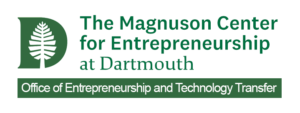Grants Support Nine Start-Ups With Nearly $20,000 In Funding
The money will be used to help early-stage ventures move their ideas forward through beta testing, legal consultation, development of a minimal viable product, and more.

The Magnuson Center for Entrepreneurship has awarded grants totaling nearly $20,000 to help nine Dartmouth startups move forward with their entrepreneurial endeavors.
The grants, announced earlier this month, include eight Founder Grants ranging from $1,000 to $3,000 per start-up, and one Class of 2005 Grant of $2,500.
Forty-two startups across a wide variety of industries applied for this round of funding, making the selection process particularly difficult, said Roy Schmidt, Program Manager for Startup Support.
“It’s challenging to compare pitches ranging from skincare, clothing, and food, to AI and healthcare,” Schmidt says. “The determining factor with so many great ideas was the timing and intended use of the funding request. We’re confident these grantees are ready to utilize the funds now to make meaningful progress.”
The grant recipients are:
Enlight: Class of 2005 Grant ($2,500)
Enlight is an ed-tech venture dedicated to bridging the digital divide in education across Africa and beyond by providing offline access to quality, up-to-date, and interactive learning resources that can democratize access to education.
“Our innovative device, the Book of Everything, broadcasts a wealth of educational content within a 60-meter radius, allowing up to 50 students to connect and utilize the content simultaneously without needing internet access,” said Founder Abdul-Kudus Alhassan ’26.
“We are on a mission to ensure that any child, irrespective of their geographic location or financial background, has access to the transformative learning resources they need to achieve their full potential,” he added.
Enlight won The Pitch competition last fall, and Alhassan and his team have persistently moved the idea forward since, Schmidt said.
“Abdul-Kudus has consistently shown his commitment and made significant progress on Enlight, currently planning two pilot programs with partners Lead Ghana and Miami EdTech,” he said.
For Alhassan and co-founders Kidus Seyoun, Emmanuel Olasoju, Muaz Surur, and Kur Peter Thon Aduot, the Class of 2005 Grant provides not only seed money but valuable recognition that boosts their confidence and commitment. The team will use the funding, along with a $10,000 grant from the University of Chicago Polsky Center, to test their project at 10 schools in Ghana.
“This recognition is incredibly meaningful to me,” Alhassan said. “It validates the hard work and dedication my team and I have invested in Enlight and reinforces the importance of our mission.”
SnowMate: $3,000 Founder Grant
SnowMate is an autonomous snow removal service that aims to address the seasonal demands of clearing snow, including a workforce shortage.
It was created by Kushagra Rawat, a Masters of Engineering Management '25 student, and Phillip Mulford, a fourth-year PhD candidate.
“Plowing a sidewalk is a rather simple problem for a robotic system to solve, and robots are unconstrained by the need for breaks or sleep,” Rawat said. “This can lead to significant potential cost savings for the hospitals, universities, and other larger institutions that have to either hire seasonal workers or divert some of their workforce for snow removal every winter.”
SnowMate provides a solution to this problem through a fleet of autonomous snow removal robots “that work around the clock to handle every axis of institutional snow removal, from pretreatment to plowing and snow removal,” he added.
Through discussions with mentors at other Magnuson programs including the Mentor Mixer, Rawat and Mulford were advised to come up with a visualization or illustration of how SnowMate will work. They’ll use the Founder Grant funding to do just that, “developing a semi-realistic model as well as animation of how we envision to develop our solution,” Rawat said.
MaryAI: $3,000 Founder Grant
MaryAI aims to make healthcare easier to access around the globe, in part by relying on the promise of artificial intelligence.
“We are making healthcare accessible in remote areas using micro-clinics equipped with portable diagnostic tools and our Integrated Digital Health Platform to help physicians diagnose and manage over 50 common diseases,” said founder Felix Davis ’26.
Davis and his team plan to use the grant to purchase supplies in order to have the first clinics running this summer in Ghana, Dominica, and Burundi.
“The Founders Grant is like a strong, supportive hand on our shoulder, assuring us that the Magnuson Center for Entrepreneurship stands behind us, believing in our mission and our ability to tackle the challenges we are passionate about,” Davis said.
uDrive: $2,700 Founder Grant
uDrive, founded by Thayer PhD candidate Yanqiao Li, is a highly efficient chip that will enable improved haptics systems—those that provide feedback to people through movement.
“uDrive develops highly efficient integrated circuit (IC) enabling the next generation haptics system which allows people to feel richer, softer touch sensation through wearable, mobile devices beyond simply click or vibration,” Li explained.
Being selected for the grant based on his research has boosted Li’s ability to keep moving the technology forward, he said. Li and his team will use the funding in part to gather data on comparable technologies that are already on the market, in order to move toward a minimum viable product.
“This encouragement will further drive me to keep pursuing my venture and it makes me more confident in being successful in the future,” he said.
Kino: $2,500 Founder Grant
Kino is an analytics platform for athletes that gives users the power to better understand their bodies by holistically looking at their health and fitness datapoints. They can then share that information with teams, gyms, and coaches to provide highly personalized to help the athlete keep progressing, said founder Jackson Gerard ’25. Gerard co-founded Kino with Toby Reynolds, a student at Ohio State University.
“The grant will help Kino gather hundreds of high quality, often expensive, datapoints,” including scans that measure body fat, muscle mass, metabolic rate, and bone density, Gerard said. “Typically, these machines cost six-figures to purchase, and hundreds of dollars to gain access to for single scans. I’m working with Dartmouth and Ohio State University connections to drop this price and achieve my vision of building a world-class model trained on the best data I can provide.”
For Gerard, the Magnuson Center has been a “home away from home” on campus.
“I’m extremely grateful for the help Roy, and the others at the Magnuson Center, have shown me over
the last couple of years,” Gerard said. “I can definitively say I wouldn’t be where I am without their help.”
ShelfQuest: $2,000 Founder Grant
ShelfQuest connects to a library’s catalog system to help patrons find books on the shelves.
"By using ShelfQuest, libraries can provide patrons with a quicker and more convenient book-finding experience, simultaneously freeing up librarians' time,” said James Underwood ’27, who co-founded the venture with Asli Tavasli ’27.
The duo will use the funding to make libraries aware of the product by attending conventions, and to cover costs including hosting servers.
“It's a huge honor for us to be recognized with a Founder Grant from the Magnuson Center. It validates our work and our vision, and we're so excited to take ShelfQuest to the next level with the resources this grant provides us,” Underwood said. “We hope our solution can improve the experience of all library patrons, from busy students to passionate bookworms.”
Briefed: $1,000 Founder Grant
Briefed is a personal news assistant that relays all the news you need to know for the day, according to Arjun Sahney ‘26, who founded the venture with Ram Gorthi ’26. The duo will use their grant money to fund operation costs for a third round of beta testing with 50 users.
“We’re really happy to receive the founder’s grant from the Magnuson Center—it shows us the amount of faith Dartmouth has in what we’re doing and we’re excited to continue building Briefed,” Sahney said.
Lifter’s Link: $1,000 Founder Grant
Lifter’s Link is a comprehensive platform for the global powerlifting community. It allows lifters, coaches and meet directors to share their performance, promote and host meets, livestream lifts, and more.
“Lifter’s Link is equipping powerlifting with infrastructure as strong as the sport,” said founder Celeste Ulicki ’24.
Ulicki will use the grant to incorporate, launch her website, and move toward a minimum viable product.
“Receiving the Founders Grant was not only material help but invaluable validation that we're building something of importance,” Ulicki said.
Spar Markets: $1,000 Founder Grant
Spar is a pay-to-play Competitive Stock Trading Platform where users can win money and develop their trading skills, says Joseph Quaratiello ’27 who founded the app with Grant Drinkwater, Boston College ’27 and Jackson Belanger, Georgia Tech ’27.
The trio will use the funds to cover legal fees and development costs.
“We appreciate this recognition and validation of our hard work thus far and the support the grant provides for business costs,” Quaratiello said.

